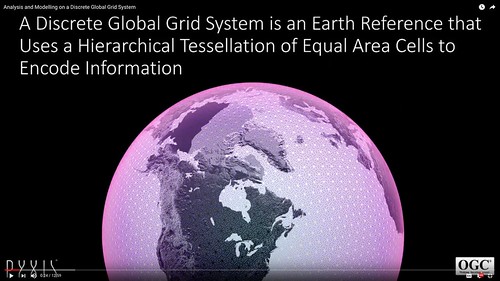The Mapparium is a Church of Christian Science project started quite awhile back, to nurture greater global awareness within the church. Not just secular governments should be privy to big picture world views. I'm sure the Vatican agrees. Spatial data management systems were an obsession of mine even then, and when AFSC paid my way to Boston, as a part of the Manhattan II project (Daniel Ellsberg and company), I made sure my pilgrimage included a visit to this holy spot.
These days I'm looking at DGGS presentations on Youtube, the above picture a screen shot from one of them. Notice the "hexapent" design, a focus of my HP4E campaign. The shoptalk of layers and levels pertains in that one may superimpose several layers at the same level, to tomographic effect, or drop down to show minerals, fossil fuel reserves, coal deposits and so forth.
If you're installing Geopandas using Anaconda, one of the best Python ecosystems, in the sense of convenient, remember to install it in its own conda environment. conda-forge has binary incompatibilities with the default Anaconda installation that are likely to bite you in the butt. Fiona is especially troublesome (that's a package Geopandas requires).
I know what you're thinking: such data layers at the lower levels would be highly prized and mineral exploration companies, oil supranationals and so on, are not about to divulge whatever secrets they've already harvested at great expense. Well, yes and no. The downside of wholly proprietary data sets is if they're not independently auditable, as in verifiable, then confidence in their reliability may suffer, even within a company or government.
Long ago, I wondered if, as a test case, a world class corporation could establish itself outside the US jurisdiction, yet within the boundaries of the United States, per some sovereign tribal, treaty established land. Yes, we know from recent examples that the USG doesn't honor the treaties it signs, but that's beside the point. The question back then is whether this experiment could succeed in principle, and Global Data (not an Inc.) was established with that in mind, as a product in part, of GST (a balancing discipline for Economics the way I cast it back then, and still do to large degree).
Anyway, that's all backstory to today's meeting about DGGS, a global data data management and visualization framework not unlike Google Earth.
Having attended a Process Workshop Institute marathon yesterday (OK, only five hours, with breaks), I had some fresh perspectives to bring to the table, perhaps jarred lose from my internal groupthink matrix.
Glenn and I were able to discuss patterns of information distribution, focusing on such institutions as hair salons (including barbershops) in the archetypal small village. Think of a WestWorld episode if that helps.
The flip side of misinformation-laced "vicious gossip" (or just "gossip") is what we might call "intelligence". The latter often comes with caveats and disclaimers, whereas the former is often "pushed" by people in no mood to be contradicted because they have agendas, which may be time critical. Gossips flock to tabloid journalism, which is sensationalistic by design, intended to stir up outrage in the face of scandal.
I called Uncle Bill from Ringlers along the way. I've cut way back on beer consumption since turning sixty, but haven't gone cold turkey. That was my 16 ounces for Friday. Today, I had my allotted 22 ounces. Having a budget helps. I had taken buses 75 and 15, having returned two overdue library books on statistics to the Belmont Branch, and paid the fine of $3.50.
OSU has more than a big toe invested in DGGS waters. I've been exploring the connections. Having more public macroscope displays is a long time mission for World Game as well, established by the Buckminster Fuller emporium as one of a suite of related 4D enterprises.
Our meet up featured the last lecture in the Complexity series from Great Courses, by professor Scott Page. You can't fix a broken heart with bandaids. What Fullerians call "precession" has everything to do with the maxim: you may control almost nothing, yet influence almost everything.
AFSC flew me to Boston for the Ellsberg summit, but also to meet with AFSC Boston and get ideas for how a youth program might work. As many a mom & pop martial arts studio will attest, having a van really helps if reaching out to minors or non-drivers, yet wanting them at some central site. AFSC Portland actually managed without a van, but then Portland public transit system (Tri-Met) is better than average. Check it out.



